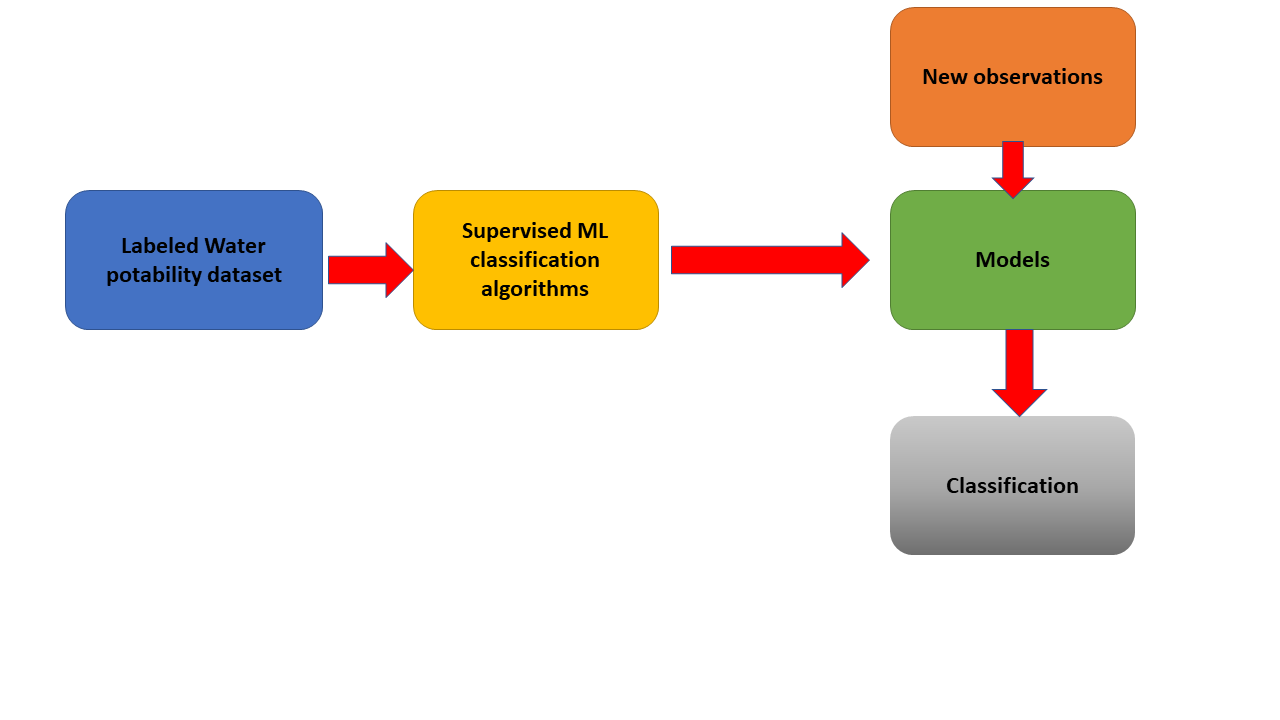Potable Water Identification with Machine Learning: An Exploration of Water Quality Parameters
Main Article Content
Abstract
In this research, we aim to determine the water potability using three machine learning classification algorithms: decision tree, gradient boosting and bagging classifier. These algorithms were trained and tested on a dataset of water quality measurements. The outcomes of the experiment showed that the gradient boosting algorithm achieved the highest F1-score of 0.78 among all the algorithms. This indicates that the gradient boosting algorithm was most effective in correctly identifying both the safe and contaminated water samples. The results of this study demonstrate that gradient boosting is a promising approach for determining water potability and can be used as a reliable method for water quality assessment.
Article Details
References
Sharma, S. and Bhattacharya, A.J.A.W.S., 2017. Drinking water contamination and treatment techniques. Applied water science, 7(3), pp.1043-1067.
Pye, V.I. and Patrick, R., 1983. Ground water contamination in the United States. Science, 221(4612), pp.713-718.
Schweitzer, L. and Noblet, J., 2018. Water contamination and pollution. In Green chemistry (pp. 261-290). Elsevier.
Bedient, P.B., Rifai, H.S. and Newell, C.J., 1994. Ground water contamination: transport and remediation. Prentice-Hall International, Inc..
Gong, J., Guo, X., Yan, X. and Hu, C., 2023. Review of Urban Drinking Water Contamination Source Identification Methods. Energies, 16(2), p.705.
Vanlalhmingmawia, C., Lee, S.M. and Tiwari, D., 2023. Plasmonic noble metal doped titanium dioxide nanocomposites: newer and exciting materials in the remediation of water contaminated with micropollutants. Journal of Water Process Engineering, 51, p.103360.
Qin, H. and Doll, G.L., 2023. Effects of Water Contamination on Micropitting and Rolling Contact Fatigue of Bearing Steels. Journal of Tribology, 145(1), p.011501.
Bradley, P.M., Romanok, K.M., Smalling, K.L., Focazio, M.J., Evans, N., Fitzpatrick, S.C., Givens, C.E., Gordon, S.E., Gray, J.L., Green, E.M. and Griffin, D.W., 2023. Bottled water contaminant exposures and potential human effects. Environment International, 171, p.107701.
Mishra, A., 2020. Artificial intelligence algorithms for the analysis of mechanical property of friction stir welded joints by using python programming. Welding Technology Review, 92.
Wuest, T., Weimer, D., Irgens, C. and Thoben, K.D., 2016. Machine learning in manufacturing: advantages, challenges, and applications. Production & Manufacturing Research, 4(1), pp.23-45.
Rai, R., Tiwari, M.K., Ivanov, D. and Dolgui, A., 2021. Machine learning in manufacturing and industry 4.0 applications. International Journal of Production Research, 59(16), pp.4773-4778.
Thapliyal, S. and Mishra, A., 2021. Machine learning classification-based approach for mechanical properties of friction stir welding of copper. Manufacturing Letters, 29, pp.52-55.
Pham, D.T. and Afify, A.A., 2005. Machine-learning techniques and their applications in manufacturing. Proceedings of the Institution of Mechanical Engineers, Part B: Journal of Engineering Manufacture, 219(5), pp.395-412.
Wang, S., Shen, Z., Shen, Z., Dong, Y., Li, Y., Cao, Y., Zhang, Y., Guo, S., Shuai, J., Yang, Y. and Lin, C., 2021. Machine-learning micropattern manufacturing. Nano Today, 38, p.101152.
Jatti, V.S., Dhabale, R.B., Mishra, A., Khedkar, N.K., Jatti, V.S. and Jatti, A.V., 2022. Machine Learning Based Predictive Modeling of Electrical Discharge Machining of Cryo-Treated NiTi, NiCu and BeCu Alloys. Applied System Innovation, 5(6), p.107.
Hu, H., Xu, J., Liu, M. and Lim, M.K., 2023. Vaccine supply chain management: An intelligent system utilizing blockchain, IoT and machine learning. Journal of Business Research, 156, p.113480.
Rosenberg-Vitorica, W., Salais-Fierro, T.E., Marmolejo-Saucedo, J.A. and Rodriguez-Aguilar, R., 2023. Machine Learning Applications in the Supply Chain, a Literature Review. Smart Applications with Advanced Machine Learning and Human-Centred Problem Design, pp.753-761.
Garinian, E.O.M., Fierro, T.E.S., Saucedo, J.A.M. and Aguilar, R.R., 2023. Machine Learning Applications for Demand Driven in Supply Chain: Literature Review. Smart Applications with Advanced Machine Learning and Human-Centred Problem Design, pp.763-772.
Hamdan, I.K., Aziguli, W., Zhang, D. and Sumarliah, E., 2023. Machine learning in supply chain: prediction of real-time e-order arrivals using ANFIS. International Journal of System Assurance Engineering and Management, pp.1-20.
Panigrahi, R.R., Dash, M., Shaikh, Z.H. and Irfan, M., 2023. Review of Machine Learning Techniques in the Supply Chain Management of Indian Industry: A Future Research Agenda. In Advanced Machine Learning Algorithms for Complex Financial Applications (pp. 199-219). IGI Global.
Mooney, S.D., 2023. Technology Platforms and Approaches for Building and Evaluating Machine Learning Methods in Healthcare. The Journal of Applied Laboratory Medicine, 8(1), pp.194-202.
Roberts, L., Dhanoa, H., Lanes, S. and Holdship, J., 2023. Machine learning for enhanced healthcare: an overview for operational and clinical leads. British Journal of Healthcare Management, 29(1), pp.12-19.
Zini, M. and Carcasci, C., 2023. Machine learning-based monitoring method for the electricity consumption of a healthcare facility in Italy. Energy, 262, p.125576.
Rayan, R.A., 2023. Machine Learning for Smart Health Care. Machine Learning Algorithms and Applications in Engineering, p.1.
Megnidio-Tchoukouegno, M. and Adedeji, J.A., 2023. Machine Learning for Road Traffic Accident Improvement and Environmental Resource Management in the Transportation Sector. Sustainability, 15(3), p.2014.
Rolczynski, B.S., Díaz, S.A., Kim, Y., Mathur, D., Klein, W.P., Medintz, I. and Melinger, J., 2023. Determining Interchromophore Effects for Energy Transport in Molecular Networks Using Machine-Learning Algorithms. Physical Chemistry Chemical Physics.
Vadlamani, S. and Modashiya, M., 2023. Improving Transportation Planning Using Machine Learning. In Encyclopedia of Data Science and Machine Learning (pp. 3076-3088). IGI Global.
Jayalakshmi, S., SV, A.K., Ranga, J., Venkatasubramanian, K. and Lavanya, Y., 2023. A Machine Learning-Based Image Segmentation for Real-Time Images in Smart Intelligent Transportation Systems. In Handbook of Research on Advanced Practical Approaches to Deepfake Detection and Applications (pp. 147-161). IGI Global.
Achyutha Prasad, N., Guruprakash, C.D., 2019. A relay mote wheeze for energy saving and network longevity enhancement in WSN. International Journal of Recent Technology and Engineering 8, 8220–8227. doi:10.35940/ijrte.C6707.098319.
Kalshetty, J. N., Achyutha Prasad, N., Mirani, D., Kumar, H., & Dhingra, H. (2022). Heart health prediction using web application. International Journal of Health Sciences, 6(S2), 5571–5578. https://doi.org/10.53730/ijhs.v6nS2.6479.
Achyutha, P. N., Hebbale, S., & Vani, V. (2022). Real time COVID-19 facemask detection using deep learning. International Journal of Health Sciences, 6(S4), 1446–1462. https://doi.org/10.53730/ijhs.v6nS4.6231

